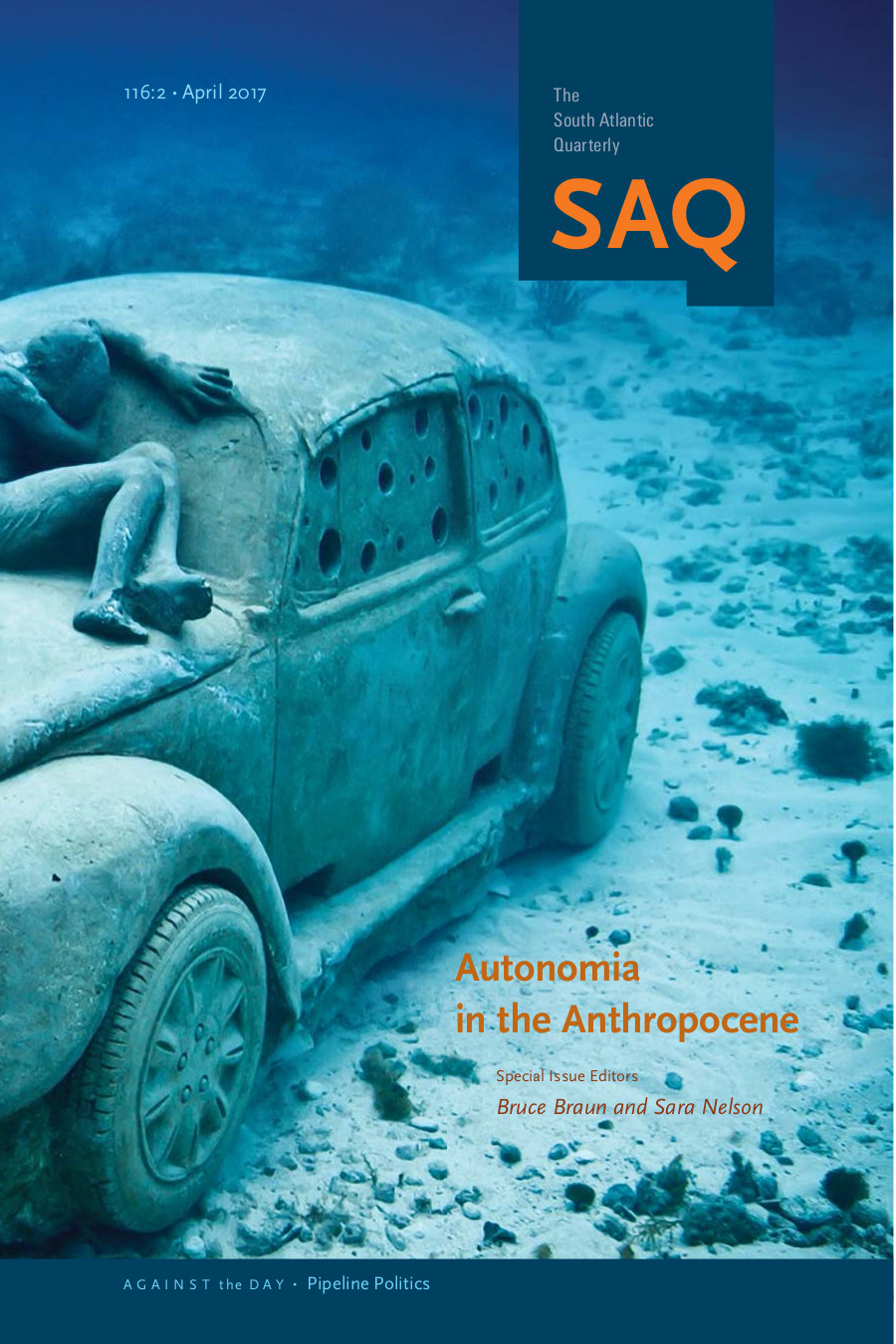South Atlantic Quarterly, 116(2): Autonomia in the Anthropocene (2017)
Filed under journal | Tags: · anthropocene, autonomy, capitalism, cognitive capitalism, commons, labour, marxism, multitude, subjectivity

“Despite Autonomia’s widespread influence on political action and post-Marxist scholarship, it has been surprisingly slow to address planetary change and environmental politics. With a focus on cognitive capitalism, many autonomist scholars have downplayed or fully ignored the ecological dimensions of post-Fordism—its foundations in extractive energy economies, its links to the accelerating financialization of nature under the banner of so-called green capitalism, its harnessing of nonhuman capacities, and its wildly uneven toxic geographies. This lack of engagement is regrettable given that, we propose, autonomist insights hold great promise for understanding both the transformed relation between capital and nonhuman natures in post-Fordism and the many political movements that have emerged in response. […]
It is no longer evident that key terms found in the autonomist lexicon—species being, the common, multitude, potentia—survive the challenge of the Anthropocene unchanged or that the production of subjectivity (a cornerstone of autonomist thought) can be understood solely in terms of language, habit, or gesture. It may therefore be necessary to think beyond the struggles of the factory floor, or those of the cognitariat today, to imagine and think from other sites of struggle, other forms of solidarity, and other experiments in “commoning.” These bring into play unfamiliar actors and unacknowledged geographies: sites of extraction and circuits of waste, indigenous communities and territories, rising seas and toxic landscapes that are materially present within the informationalized economies of global capitalism, but often invisible to those working within them. We might say, then, that the Anthropocene names autonomist Marxism’s unthought, an unthought that intrudes on its political imaginaries. What happens to autonomism if it begins to question the autonomy of the human? Or if it leaves its privileged sites in the global North?”
With contributions by Sara Nelson and Bruce Braun, Miriam Tola, Jason Read, Elizabeth R. Johnson, Elizabeth A. Povinelli, Matteo Pasquinelli, Karen Pinkus, Marco Armiero and Massimo De Angelis, Anja Kanngieser and Nicholas Beuret, and Isabelle Stengers.
Edited by Sara Nelson and Bruce Braun
Publisher Duke University Press, Apr 2017
ISSN 0038-2876
178 pages
transversal, 01/13: The Languages of the Banlieues (2013) [EN, DE, FR, Arabic]
Filed under journal | Tags: · capitalism, cognitive capitalism, geopolitics, knowledge, knowledge production, labour, theory
“The crises within cognitive capitalism and cognitive labor are mirrored in the reproduction and exacerbation of global divisions of labor and the emergence of new forms of exploitation as part of a regime of flexible capital accumulation. While drastic austerity measures and heightened control mechanisms lead to a radical transformation of the welfare state on the one hand, new networks of communication, struggle and alternative forms of knowledge emerge on the other.
This issue of transversal attempts to review some of the general assumptions of a theory of cognitive capitalism and to unsettle the very notions of knowledge and its production, discussing the conditions of its capture, its “re-invention” and its capacity for creating worlds. The individual essays follow the lines of a (post-)colonial historicity and a feminist and geopolitical critique of capitalist valorization, thereby questioning the materiality of knowledge and its production in relation to resources and bodies, as well as how art and knowledge production are interwoven with political struggles.” (Editorial)
With contributions by Anne Querrien, Marc Hatzfeld, Amina Bensalah/Myriam Suchet, Boris Seguin, Sonia Chikh (Les engraineurs), Abdoulah Bensaid (Musik à Venir), Françoise Dibotto Soppi.
Editors: Lina Dokuzović, Therese Kaufmann, Raimund Minichbauer, Radostina Patulova
Publisher eipcp – European Institute for Progressive Cultural Policies, Vienna/Linz
Copyleft
ISSN 1811-1696
HTML (updated on 2020-4-18)
Previous issue
Edu-factory. Samoorganizacja i opór w fabrykach wiedzy (2012) [Polish]
Filed under book | Tags: · capitalism, cognitive capitalism, education, knowledge production, resistance, self-organization

“Uniwersytet znalazł się dziś z pewnością w centrum zainteresowania wielu światowych i lokalnych graczy politycznych i ekonomicznych. Świadczy o tym choćby fakt, że nawet w Polsce, po dwudziestu latach pozostawiania uczelni samym sobie, podjęto szybkie i zdecydowane kroki, by podporządkować go rynkowej logice rentowności, pomiaru efektywności, konkurencji oraz zysku. Od zawsze był on jednak poddawany różnym naciskom. Dziś, kiedy jego znaczenie radykalnie wzrosło, a presja wywierana przez rozmaite podmioty stała się tak duża, nie sposób dłużej nawet łudzić się, że uniwersytet jest jakkolwiek autonomiczną strukturą.
Jego autonomię można wypracować i z tego względu z pewnością musi być on dzisiaj polem walki – polem, na którym od kilkunastu lat ruchy społeczne w Polsce ponoszą dotkliwą klęskę. Nieważne czy wymienimy tu ruchy studenckie, pracownicze, czy obywatelskie. Ich klęska jest podwójna: tam, gdzie się pojawiają, nie są w stanie wiele wywalczyć z powodu braku szerszego poparcia w środowisku studentów i wykładowców, a w wielu miejscach i momentach, gdy wyartykułowany powinien zostać głos sprzeciwu, zaobserwować można tylko całkowitą bierność i milczenie. Może to zaskakiwać, bo stawka w tej walce jest tyleż wysoka, co oczywista. W czasach, gdy coraz większe znaczenie dla gospodarki i reprodukcji życia społecznego ma wiedza, walka o równość, wolność i demokrację staje się w coraz większym stopniu również walką o równość i swobodę w dostępie do edukacji oraz wolność i demokratyzację produkcji wiedzy.
Czy tym, czym kiedyś dla kapitalizmu przemysłowego była fabryka, dziś dla kapitalizmu kognitywnego jest uniwersytet? Czy możemy zaobserwować podobne mechanizmy wyzysku i kontroli pracy? Czy uniwersytet może być skuteczną przestrzenią organizacji oporu, podobną do tej, jaką stanowiły fabryki ery industrialnej? Te i wiele innych pytań przepuszczonych przez metaforyczną soczewkę „uniwersytetu-fabryki”, pozwoliło na przeprowadzenie dogłębnych, kolektywnych badań, które członkowie Edu-factory przedstawili w Towards a Global Autonomous University. Polska książka Edu-factory. Samoorganizacja i opór w fabrykach wiedzy wychodzi od tamtych rozważań, poszerza ich zakres i próbuje odnieść je do warunków, w których rozwijają się półperyferyjne uniwersytety.”
Editors: Jan Sowa, Krystian Szadkowski
Publisher: Korporacja Ha!art, Kraków, March 2012
Linia Radykalna series
Creative Commons Uznanie autorstwa Na tych samych warunkach 2.5 Polska
ISBN: 978-83-62574-39-1
330 pages

